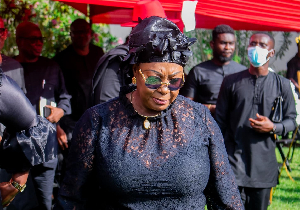Opinions of Sunday, 9 June 2013
Columnist: Rii, Jedd
The Way of the Spider.
First counsel for the Respondent Mr Tsikata clamours for an audit of the electoral forms, then when it was granted, shadowy figures turn up at the court’s Registry demanding the keys to the evidence.
The court is a secure facility with its own security detail. None of the judges asked for additional security, so on what basis or jurisdiction, did these shadowy figures claiming to be from one of the national security agencies give, for going to the premises of a courthouse, to execute a “warrant” which has not been issued by a judge?
I don’t know if any national security agency is mandated to act outside the law, but it is very clear that those shadowy figures were acting without a clear mandate or jurisdiction, because they were turned away and were unable to execute the “warrant”. If they were acting within the law, that should not have been the case. We are still unclear if those characters were indeed from an agency of national security.
The most intriguing aspect of the case is not the incursion of the shadowy figures on the courts premises, but the subsequent action of counsels for the respondents headed by Mr Tsikata. No sooner had the request for an audit been granted did Mr Tsikata and co start crying foul. They claimed, that additional evidence in containers were added to the ones the audit firm was mandated to count, and this was ascertained following an initial audit by all parties to the claim and KPMG the international audit firm.
There was no such audit.
We know this, because the petitioners and the international audit firm KPMG, have all denied having been part of any such audit before the count. To buttress this, the court refused to raise any issues to this allegation, telling Mr Tsikata and co. to file a complaint which will be added to the final report of the audit [we will come back to that later].
It was intriguing when Mr Tsikata started clamouring for an audit of the electoral forms and even more so when that request was granted after the court had earlier issued a directive that the matters regarding those forms should be left to them [the panel]. If we take an average, that all the judges have had thirty years legal experience, that will be a combined total of two hundred and seventy years of legal experience; you have to show some respect; you have to show some serious respect! [Emphasis mine].
When you submit evidence to a court, there is no doubt about the security of its integrity while it is with the courts. It is inconceivable, that nine judges sitting on an important case, will allow evidence submitted to them to be tainted and raising such an allegation without evidence is an affront.
The suggestion that an audit should rather be taken from copies given to the judges, does not mitigate the attack levelled at the integrity of the court. Any documents held by judges would most likely have been kept on the same premises. If it is the claim by the respondents that the petitioners were able to smuggle more evidence past all the court’s security and place them next to those already at the courts, simply changing the location to another part of the premises is unlikely to be a problem. I would go with Mr Addison’s theory that it is a “cooked up” story.
So what if additional containers were indeed added to the ones which had the evidence that KPMG was mandated to count. What if it was a “test” set up by the court.
The hard question is this: How was Mr Tsikata able to gain access to a secure facility of the court [when everybody was away] to establish that the number of containers have increased? How did he establish that those additional containers, had more evidence? KPMG was not mandated to count containers but evidence. The evidence room in a courthouse is secure and can have many containers with evidence on different cases, all labelled.
If the court set up such an arrangement for a reason which was supposed to be a “test” and Mr Tsikata got to know, he must have been a Houdini or must have got that information somehow.
[Back to the “filing the complaint”]. If Mr Tsikata like everybody else was not supposed to know the “test” at the secure area of the court, and somehow he got to know, filing that complaint will amount to signing a confession. Even if he does not do that, he has admitted in open court, with judges as witnesses that he knew. He would have to explain to the court, how he was able to get information from a secure area of the court which was out of bounds to everyone else.
It is all beginning to sound like a story about the African folklore character; Ananse. Attempting to pull a caper in court is most unwise [you will most likely fail]. However, if you have two hundred and seventy years of judicial potency sitting in front of you, trying to pull a caper is just... [I would not recommend it].
I always maintain that if you want to experience what it feels like to have a really bad headache, just walk into a court room as if you own it. Anyone into buying shares, would be advised to look into pharmaceuticals. It might seem like there is going to be a high demand for paracetamol.
Jedd Rii
Link: aabicoleridge@live.co.uk












